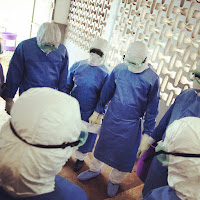By Agomoni Ganguli-Mitra and Nayha Sethi
In 2016, in the
wake of the Ebola and the Zika outbreaks, the international community’s
response to global health emergencies and their associated moral,
regulatory and political implications once again came under intense
scrutiny. For the bioethics and governance communities these were real
challenges, forcing us to revisit some of the most difficult ethical
questions around pandemics, such as health inequality, weak health system and access to care, and reproductive health. The challenges were
all the greater for having to address them within the global
(heterogenous) regulatory systems. The response to Ebola for example,
developing at the intersection between humanitarian response, care, and
research activities - each with their values and goals - brought into
question well established ethical norms and practices. It was against
this background that the Nuffield Council on Bioethics launched a call
to commission research on research in the context of global health
emergencies.
We were fortunate to win the
commission to take on this work. The brief was clear: we were to produce
a background paper on the ethical and governance issues raised by
research in the context of global health emergencies. The result was a
challenging, but extremely interesting experience for both of us. As
newcomers to the topic, there were unexpected obstacles. For example, we
spent quite a few hours questioning what might, or might not count as a
global health emergency. We also faced obstacles many academics will be
familiar with: how to reduce a wealth of literature (relevant
regulatory and governance tools, laws, partnerships, practices, actors,
cases, practices and lessons-learned) into a short, comprehensive
document that would be accessible, and of use to the Council.
In
the end, however, teasing out some of the conflicts was one of the most
interesting exercises. For example, in the particular context of
infectious diseases, how do we reconcile the ‘moral obligation to learn
as much as possible, as quickly as possible’ (WHO 2016) with the
seemingly equally important norm of not sacrificing care for the sake of
conducting research? Perhaps unsurprisingly, then, our concluding
section was organised around various sets of tensions:
1.
Tensions between ‘response’ and ‘research’: for example, how can care,
research and innovation co-exist efficiently and ethically?
2.
Tensions within research: for example to what extent can we develop
anticipatory ethical and regulatory frameworks for research during
epidemics, in a context where oversight and governance need to be
particularly sensitive and responsive to evolving and emerging
situations?
3. Tensions arising in priority-setting and
collaboration: for example, when engaging local, regional and global
communities, how do we ensure that all voices are heard and differing
priorities are taken into account?
It is not often that
academics witness their work being put to immediate practical use. In
this case, our background paper served to inform a workshop at the
Nuffield Council on Bioethics, to which we were also invited. The event
brought together
scientists, physicians, responders, regulators,
ethicists and other stakeholders to discuss some of the issues arising
from the paper. We have certainly been inspired to think in-depth about
some of the issues we encountered while writing. We are grateful to the
Council for providing us with the opportunity to do so, and we look
forward to continuing to contribute to this important field.
The background paper can be accessed here.

